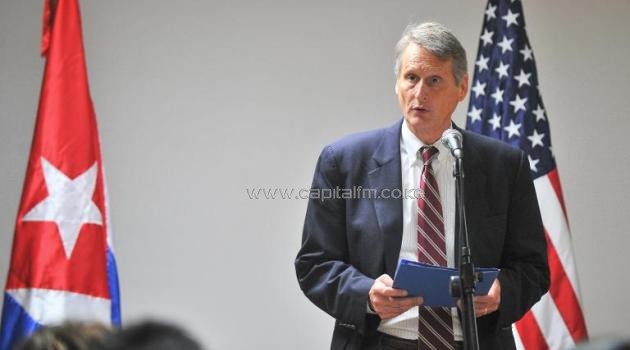
US deputy assistant secretary of state for Western Hemisphere affairs, Alex Lee, speaks during a press conference at the Convention Palace in Havana on January 21, 2015/AFP
HAVANA, Jan 22- US and Cuban officials claimed a good first day in historic talks in Havana on Wednesday, despite disagreements over migration policies ahead of negotiations on restoring diplomatic ties.
Each side welcomed the first of two days of talks as productive and constructive even though they remained deeply at odds over the exodus of Cubans to the United States.
It was the first meeting in Havana since the momentous decision by US President Barack Obama and Cuban leader Raul Castro in December to seek normal ties.
Roberta Jacobson, the US assistant secretary of state for Western Hemisphere affairs, became the highest ranking American official to set foot in Cuba since 1980 when she landed in Havana around midday.
She was due to meet Cuban counterparts for a working dinner on the eve of talks aimed at negotiating the reopening of embassies in Havana and Washington, a US official said.
In Washington, US Secretary of State John Kerry said the two sides still have much to negotiate before the Cold War rivals can normalize ties frozen since 1961.
“When it is timely, when it is appropriate, I’ll look forward to traveling to Cuba in order to formally open an embassy and begin to move forward,” Kerry told reporters.
– Migration dispute –
Jacobson’s deputy, Alex Lee, represented the US side on the first day of talks in the capital’s Convention Center, sitting across from the head of the Cuban foreign ministry’s US affairs department, Josefina Vidal.
“The productive and collaborative nature of today’s discussion proves that despite the clear differences that remain between our countries, the United States and Cuba can find opportunities to advance our mutually shared interests,” Lee said after the talks.
For her part, Vidal said: “Cuba aspires to have a normal relationship with the United States, in the broader sense but also in the area of migration.”
But Vidal criticized US migration policies which she said encourage a brain drain, saying that they “don’t reflect the current bilateral context of relations between Cuba and the United States.”
The migration talks tackled an issue that has vexed both nations for years, with Cubans regularly hopping on rickety boats to reach Florida, 145 kilometers (90 miles) away.
US policy gives Cubans who set foot in the United States quick access to permanent residency while those caught at sea are deported back home.
The United States has seen a surge of Cuban migrants who apparently fear that the US-Cuba negotiations will end the policy, a Cold War holdover that only Cuban enjoy. The number of sea intercepts doubled in December compared to the previous year.
But Lee said the Obama administration was “completely committed” to upholding the current rules.
For Thursday’s embassy talks, the US side wants Cuba to reaccredit its diplomats; lift travel restrictions for them within the island; ease shipments to the US mission; and lift a cap on personnel.
Both nations currently have “interests sections” in each other’s capitals.
In a statement, the Cuban delegation voiced “deep concerns” over the situation of their interest section in Washington, saying the US embargo has left its consulate without banking services for almost a year.
– Obama wants embargo lifted –
Ordinary Cubans hope the rapprochement will improve their lives in a country where supermarket shelves often lack basic goods and people make $20 a month on average.
Obama urged the Congress on Tuesday to end the decades-long embargo against Cuba, which the Castro regime regularly blames for the country’s economic woes.
The island’s dissident community has had a mixed reaction, praising Obama while voicing concern that too much was conceded to the government without getting much in return.
In Washington, some Cuban-American lawmakers have criticized Obama, saying the administration had given up too much without securing human rights commitments.
“As the administration pursues further engagement with Cuba, I urge you to link the pace of changes in US policy to reciprocal action from the Castro regime,” Senator Bob Menendez, a fellow Democrat, said in a letter to Kerry.
The two countries have already taken steps to thaw their once glacial relations.
The Cuban government completed this month the release of 53 political prisoners demanded by Washington.
Days later, Washington eased a few travel and trade restrictions; most Americans however still cannot pay a normal visit to Cuba as tourists.









































